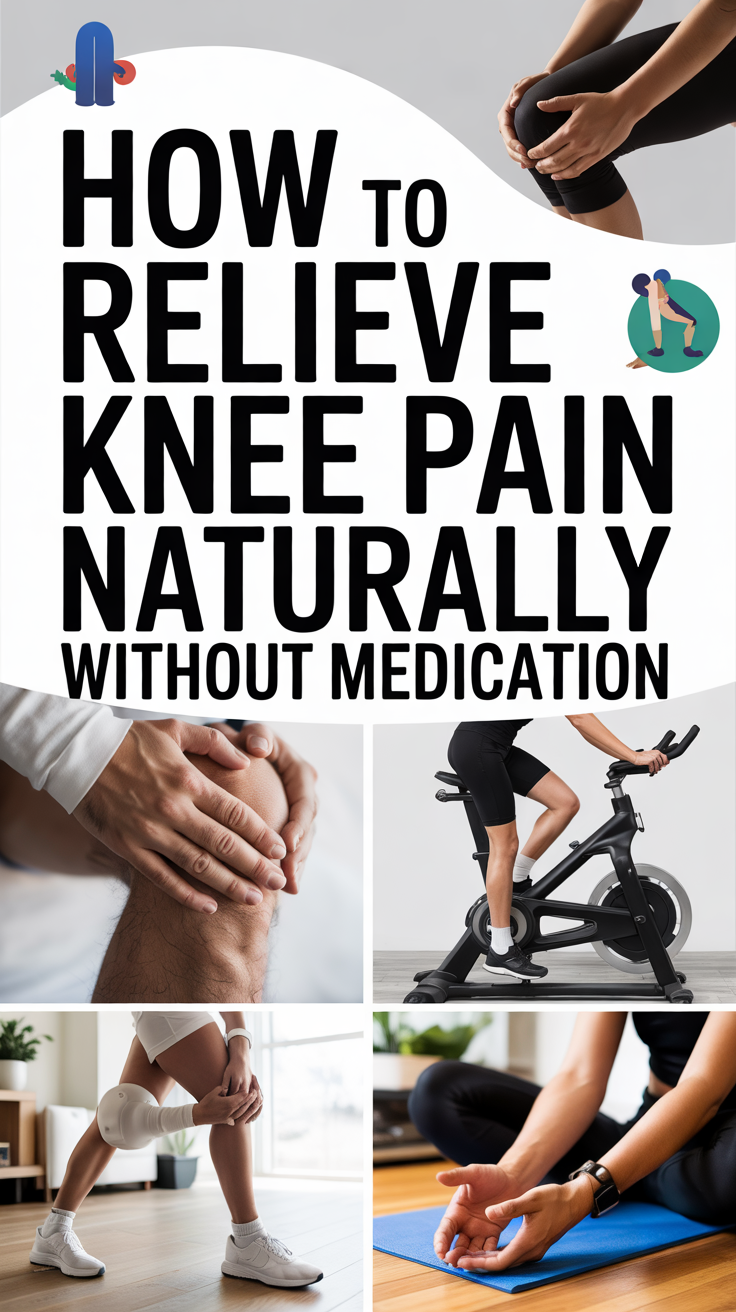How to Relieve Knee Pain Naturally Without Medication
Knee pain can be frustrating, but there are natural ways to find relief without relying on medication. By making simple adjustments to your exercise routine and diet, you can support your joint health effectively. Consider the benefits of holistic therapies and lifestyle changes that could enhance your overall well-being. The path to alleviating your discomfort might be more straightforward than you think, and discovering the right combination of strategies could be key.
Understanding Knee Pain: Causes and Symptoms
When you experience knee pain, it’s essential to understand its causes and symptoms to effectively address it. Common causes include arthritis, injuries, and overuse. You might feel sharp pain, swelling, or stiffness, which can hinder daily activities. Recognizing these symptoms helps you connect with others facing similar challenges. Additionally, anti-inflammatory benefits from natural remedies like turmeric and ginger can significantly enhance your recovery process. Understanding the common causes of knee pain can guide you in selecting the most effective treatments. To find comfort and support, consider exploring knee pain relief remedies like hot and cold therapy, compression, or elevation. These approaches can ease discomfort and promote healing. Additionally, common symptoms such as clicking sounds or weakness when walking can indicate the severity of your condition.
The Role of Exercise in Knee Pain Relief
Although knee pain can be debilitating, incorporating the right exercises into your routine can significantly alleviate discomfort and improve mobility.
Gentle activities like swimming, cycling, and yoga strengthen muscles around your knee, providing vital support. Additionally, natural compounds such as turmeric and ginger are effective in reducing inflammation, which can enhance your overall comfort while exercising. Research shows that natural remedies enhance the body’s innate healing mechanisms, further supporting your efforts. Stretching helps maintain flexibility, while balance exercises enhance stability, reducing the risk of injury.
Remember, consistency is key—start slow and gradually increase intensity. Engaging in group classes can foster a sense of community, making it easier to stick with your routine. Additionally, daily stretching can improve flexibility and reduce stiffness, further aiding in pain relief.
You’re not alone in this journey; many others find relief through exercise, creating a supportive environment where everyone can thrive together.
Dietary Changes to Support Joint Health
Making dietary changes can play a crucial role in supporting joint health and alleviating knee pain.
By incorporating the right foods into your meals, you can nourish your joints and enjoy a more active lifestyle.
Here are three dietary changes to consider:
-
Omega-3 Fatty Acids: Include fatty fish like salmon or walnuts to reduce inflammation.
-
Colorful Fruits and Vegetables: Eat a variety of berries, spinach, and bell peppers packed with antioxidants.
-
Whole Grains: Choose brown rice or quinoa over refined grains to maintain a healthy weight and reduce joint stress.
Embrace these changes together for better joint health!
Natural Supplements for Knee Pain Relief
In addition to dietary changes, natural supplements can offer significant relief for knee pain.
Glucosamine and chondroitin are popular choices, often working together to support cartilage health. Omega-3 fatty acids, found in fish oil, can reduce inflammation and improve joint function.
Turmeric, with its active compound curcumin, is another powerful anti-inflammatory that may ease discomfort. Don’t overlook the benefits of vitamin D and calcium, vital for bone health.
Always consult with a healthcare professional before starting any new supplements, ensuring they fit your needs.
Holistic Therapies: Acupuncture and Massage
When you’re seeking relief from knee pain, exploring holistic therapies like acupuncture and massage can provide effective alternatives.
These treatments focus on your body’s natural healing processes, fostering a sense of well-being and connection.
Here are three ways they can help:
-
Acupuncture: This ancient practice targets specific points, reducing inflammation and promoting circulation.
-
Massage: Gentle manipulation of muscles and tissues can alleviate tension and improve flexibility.
-
Mindfulness: Both therapies encourage relaxation, helping you manage stress and enhance your overall experience of healing.
Lifestyle Modifications for Long-term Relief
To achieve long-term relief from knee pain, implementing lifestyle modifications is essential.
Start by incorporating gentle exercises like walking or swimming into your routine; these can strengthen your muscles and improve flexibility. Pay attention to your weight, as maintaining a healthy number can reduce pressure on your knees.
Additionally, focus on a balanced diet rich in anti-inflammatory foods, like fruits and vegetables. Don’t forget about proper footwear; supportive shoes make a big difference.
Lastly, embrace mindfulness techniques like yoga or meditation to manage stress, which can exacerbate pain. Together, these changes can foster a supportive community for your knee health. Furthermore, engaging in low-impact activities can further alleviate stress on your knees while promoting overall fitness.

